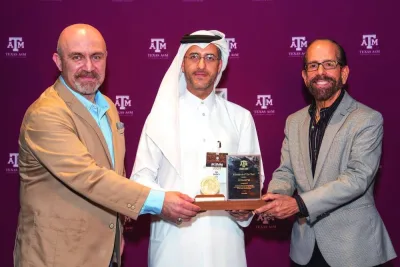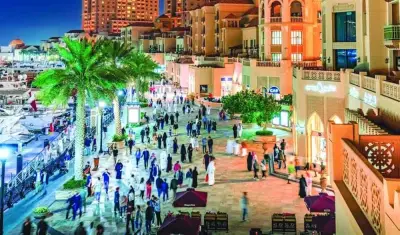JOINT EFFORT: Ahwaz Akhtar, Thanos Sardellis, Haroon Yasin, and Fatima Ramadan Sanz, all students at GU-Q, alongside Ahsan Malik, a student at Warwick University, have been working together on the project to create a school in a village predominantly inhabited by Afghan refugees in Islamabad.
Georgetown University students seek funding for
innovative slum education project in Islamabad
Four students from Georgetown University in Qatar (GU-Q) have developed an innovative and breakthrough project to create a school in a slum village in Islamabad, Pakistan, where the curriculum and other school decisions are developed in co-operation with the village community.
The group of students, called Orenda Project, came together a year ago when they were selected for the 2013-2014 Wise Learners’ Voice programme to create a project that addresses and solves a current educational issue in an innovative manner, and they hope to present their idea at the ongoing Wise Conference in Doha.
Ahwaz Akhtar, Thanos Sardellis, Haroon Yasin, and Fatima Ramadan Sanz, all students at GU-Q, alongside Ahsan Malik, a student at Warwick University, have been working together on the project to create a school in a village predominantly inhabited by Afghan refugees in Islamabad. What sets this project apart from others is the heavy reliance on co-creation, or collaboration with the community the school will serve through ‘co-creation workshops’.
“Orenda Project’s mission is to use contextualised education to alleviate poverty among marginalised populations, by establishing schools that are co-created with the beneficiaries,” said Haroon Yasin, a senior, majoring in International Politics. In order to do this, Yasin flew to Islamabad in the summer of 2014 to carry out research on 160 Afghan refugee households, where he conducted a survey to document their appalling living conditions. Yasin brainstormed many of the ideas for the school with members of the Afghan refugee community, and hopes construction can begin in August next year, if the students are able to secure funding at the Wise conference.
Dr Gerd Nonneman, the dean of GU-Q, commented on the project, saying: “One of our missions at Georgetown University is to educate critical thinkers who will become visionary global leaders. The impressive work our students have already done in establishing campus organisations that give back to the community, along with this impressive proposal for a co-creative approach to education, is a testament to those leadership skills, and we look forward to seeing it come to fruition with proper funding.”
Explaining the need for their proposal, Thanos Sardellis, a junior studying Culture and Politics, said: “Today almost 1bn people live in crowded, unsanitary shantytowns around the world due to massive migration to urban areas in search of a better life. But because of poverty levels, there’s little access to education, and many environmental and health risks.”
Repeating the project’s mission statement, he added, “We believe all those in shantytowns have the potential to achieve. They just need the tools and education to shine. We are here to help them achieve their potential.
“Our project also includes sustainable plans to construct the building using local materials, which makes the building cost effective. This means we can spend that money on securing curriculum supplies and for other needs,” said GU-Q alumna, Fatima Sanz.
They also plan on including basic hygiene education to help prevent disease, and entrepreneurship training in their contextualised curriculum, so that slum populations are equipped with the skills needed to improve their communities using the few resources that are available.
In 2011, Haroon Yasin launched Akhuwat-e-Awam, a school that provides free education to impoverished children in Pakistan, currently providing lessons to 40 children aged five to 15. The successful project turned into a GU-Q campus club where student members decide all matters pertaining to the school.
You can find out more about Orenda Project on their website (www.orendaproject.org) or follow their updates on Facebook (facebook.com/ProjectOrenda).



